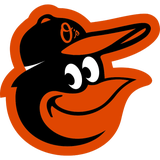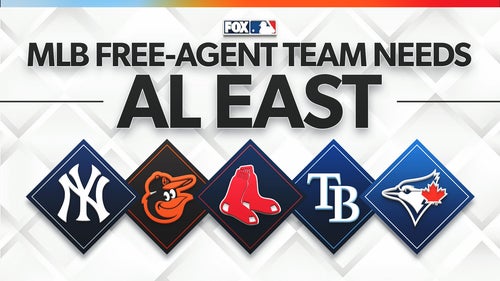
Mailbag: Seattle Mariners' woes, Jason Hammel's rollercoaster, Jacob deGrom's dominance
Yeah, I'm back from Cincinnati, where I rediscovered a love for Home Run Derby that I'd not felt since Mark Scott's untimely death. Now I'm wondering how many years until we start complaining about it again, but I suppose that's up to the Lords of Baseball and the TV folks, who sometimes don't really care a great deal about our petty pleasures.
Now, your questions via Facebook!
So, first half of last year Jason Hammel looks really good with the Cubs. He gets traded to Oakland and looks mediocre at best, then signs with the Cubs in the offseason and suddenly looks like one of the better pitchers in baseball at the age of 32. What's going on?
- Colin Christopher
This would be an interesting conversation with Hammel, right? Or maybe it wouldn't be. Some players can be highly articulate when parsing the vicissitudes of their careers, and some cannot. Or choose not to be.
Anyway, it's not quite so simple as you suggest. While it's true that Hammel does seem to have been really good with the Cubs, then not so good with the A's, and then really good again with the Cubs, he showed similar performance variance even earlier. He pitched quite well for the Rockies in 2009 and '10, and quite well again with the Orioles in 2012, but not so well with the Rockies in '11 and not so well with the O's in '13.
Just looking at Hammel's pitches, it's hard to see any reason for all these differences, as he's always thrown 92-93 mph, every season of his career. In just the past couple of seasons, he has thrown significantly more sliders and significantly fewer curveballs, which might help explain his elevated strikeout rate this season.
Next, a couple of questions about the American League's biggest bummer...
Why was a team made up of mostly reclamation projects and players who have never got it done in the big leagues given serious consideration as contenders?
I'm talking about you, Seattle. Isn't it time to get rid of that GM who continually puts out such turns of a team?
- Michael Bradley
Do you think Robinson Cano will salvage his dismal season in the second half? I know he is battling acid reflux and that's not allowing him to eat and it's making him weak, but I would imagine a player of his caliber would have much more than .250-6-30 in him even if he was dealing with internal issues.
- Trevor Miedema
Well, that depends completely upon the severity of the issues, right?
Oddly, Cano's batted-ball data looks completely fine; for example, his hard-hit percentage is higher than last season, and slightly above his career average. But then you look at his control of the strike zone, which has deteriorated badly; his strikeout rate is the highest of his career, walk rate his lowest since 2008. With both figures a LOT worse than last season.
What does all that mean? That he's generating just as much bat speed as usual, but committing to pitches earlier because he's not seeing the ball as well? I don't know. But I don't see any obvious reason to expect real improvement in the second half. Well, except for the obvious reason that players usually play to their fundamental skills. If they're healthy. And there's just no telling how healthy Cano really is, or will be.
About the Mariners generally, what the hell? Last winter after the M's signed Nelson Cruz, they looked something like the best team in the American League. I wasn't a big fan of some of their later moves, but those wouldn't have changed the team projection much. Which was for around 90 wins. So yes, this team has badly underperformed, thanks to Cano but also to Mike Zunino and Dustin Ackley and Hisashi Iwakuma and Fernando Rodney and a few others, I'm sure. Basically, the M's have suffered from a bunch of lousy performances and benefited from just one or two great ones. Which is how you lose. And might finally cost Jack Z his job.
Is Dayton Moore trolling us? Did he see the strikeout scourge coming and find the market inefficiency of players who put the ball in play? And inexpensive flyball pitchers who use the huge home stadium and excellent defense to their advantage? Is this real life?
- Nick Blakeley
Man, I don't know what it is. By all right, according to all the preseason projections, last year's August-to-October Royals were supposed to be a flash in the pan, especially with the departure of James Shields. So instead they've got the best record in the American League, despite the absence of anyone resembling an ace starting pitcher? Even remotely?
Answering your question directly, though ... No, I don't believe that Dayton Moore or anyone else saw #StrikeoutScourge coming. Or rather, I don't believe that even if they did see it coming, they knew just what to do about it. Especially considering that the Royals' relief pitchers are taking full advantage of the Scourge, but their starters are not. At all.
Iâll certainly give Moore a great deal of credit for being patient with Eric Hosmer and Mike Moustakas, and for trading for Lorenzo Cain and Alcides Escobar, and for signing Kendrys Morales, and for finally realizing that Wade Davis ain't no starting pitcher.
The rest of it, though? I don't know, man. I look forward to reading the book someday. I just hope Andy McCullough's taking good notes.
No one's talking about the 10 pitches from Jacob deGrom in the All-Star Game. Is he a legit Cy Young Candidate?
- Rob Shaw
Sure he's legit! Cy Young voters don't care so much for wins and losses anymore, but they do care about ERA and strikeouts, and deGrom's striking out nearly a batter per inning and he's got the fourth-lowest ERA in the National League. He's obviously not the best candidate, as that would be either Zack Greinke (ERA) or Max Scherzer (strikeouts). But deGrom's got a chance, with a strong second half, to be a part of the conversation.
Which is a good enough story in itself, right? Considering that just two measly years and three months ago, Baseball America didn't even list deGrom among the Mets' 10 best prospects? And that he hadn't yet pitched above Class A?
How would a 154-game season affect records? Would we use asterisks?
- Raymond Moushilou
Uh, no asterisks. Remember, they've been playing 162 games per season for only 54 years, which is well under half of major-league history (including the National League and American Association in the 19th Century). Granted, I suspect that more than half of all games have been played with the current season length; before 1961, there were only 16 major-league teams.
So, two points here.
One, there's nothing at all sacred about 162.
And two, exactly which records are we talking about? The current single-season doubles and triples records were set back in the 154-game era. I don't see anybody hitting 70 home runs, 154 or 162. No pitcher's going to break the single-season strikeouts record -- or any other single-season record that I can think of -- no matter the season length, because they just won't pitch enough innings. Even the saves record now seems safe, either way, with managers unwilling to let their closers pitch in three straight games, let alone four.
So even if I cared about the single-season records, I wouldn't expect a slightly shorter season to make much difference.
I can think of only one place where it might really show up: A shorter schedule would make it just a little bit harder for pitchers to win 20 games, or even 19 or 18 or whatever. Which, over the course of a long career, might mean eight or 10 or a dozen fewer wins, depending on the pitcher's luck. And Hall of Fame voters still seem to care a great deal about career wins.
Even that, though ... We're talking a lot of years down the road before this would conceivably matter, and by then nearly all the voters will have adjusted to the realities of modern pitcher usage.
On balance, then? No, shaving eight games from the schedule won't make much difference to anyone at all, statistically. Except it'll be just a little harder to reach those few career milestones that anyone cares about.
Who should the Pirates target?
- Bill Gordon
I'm just going to assume you mean for trade purposes?
Hey, the Pirates don't have many weaknesses at all. The only two weak links in the lineup have been Jordy Mercer and Gregory Polanco, and both seem more talented than their anemic numbers might suggest. Granted, Josh Harrison's injury weakened an already weak bench. So an infielder with some pop would really help, along with maybe a short-term platoon partner for Polanco. The Pirates have reportedly expressed some interest in the Phillies' Ben Revere and Jeff Francoeur, but Revere (like Polanco) bats lefty and Francoeur ... well, you know. Then again, the Pirates are carrying Travis Ishikawa on their roster right now, so maybe I don't know the organization as well as I thought.
They've also been tied to Aramis Ramirez, which might make sense if the Pirates think he'll hit better in the second half of the season than the first. Because so far this season, he's looked like toast.
Of course, I'm just talking. Next week on the JABO Podcast, guest J.P. Morosi will be laying some knowledge on you. Hope to see you then, or later in the week when we do this again.



